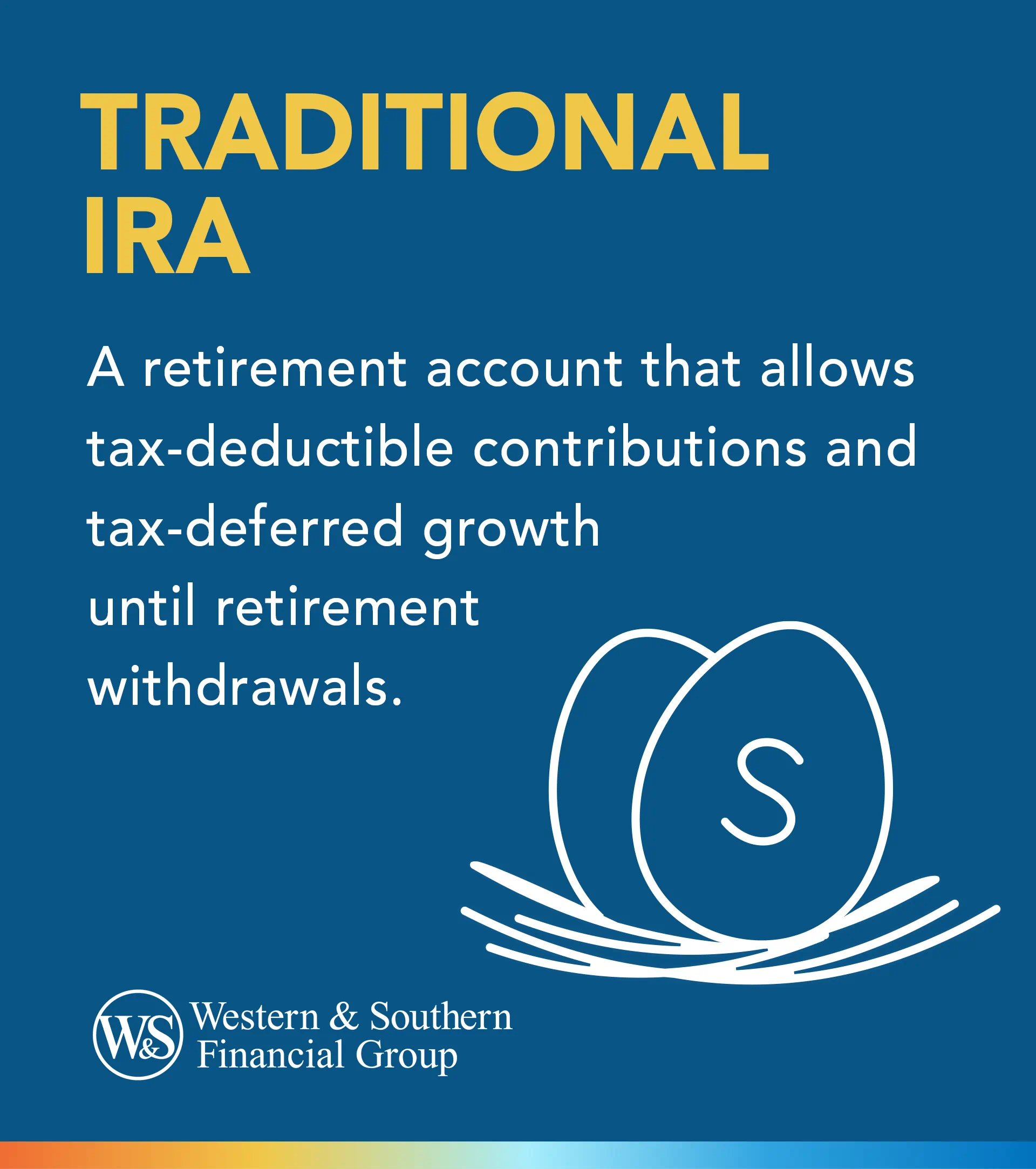

Table of Contents
Key Takeaways
- A traditional IRA is a retirement investment account that offers tax benefits and allows contributions up to $7,000 (or $8,000 if aged 50 or older).
- It's not connected to your job, so you can open one independently even without a retirement plan at work.
- Contributions are tax-deductible, reducing your income tax burden, and investment earnings grow tax-deferred until withdrawal during retirement.
- There are income limits for tax deductions if you or your spouse have a retirement plan at work.
- Withdrawals before age 59 1/2 may incur a 10 percent tax penalty, but certain exceptions apply.
When retirement is decades away, it can be hard to feel motivated about saving. You know you should put something aside for your golden years, but you also need money now to buy groceries, fix the car and pay the rent or mortgage. Retirement could allow you to finally pursue your passions and take off on new adventures.
Traditional IRA Defined
A traditional individual retirement account (IRA) is a type of investment account designed specifically for retirement. Once you set up your account, which can be done with many financial services companies, you add money to it throughout the year. You can usually invest your IRA money into a wide range of assets, including stocks, bonds, mutual funds and bank certificates of deposit (CDs). Your investment options will vary depending on where you set up your IRA.
IRAs are similar to 401(k)s, but they're not connected to your job. You can open a traditional IRA at any time and don't need your employer to do it for you. This comes in handy if you don't have a retirement plan at work.
How Much Can You Contribute to a Traditional IRA?
According to the Internal Revenue Service (IRS), you can add up to:
- $7,000 per year if you're younger than 50 years old
- $8,000 per year if you're age 50 or older.1
The government adjusts the IRA contribution limits over time, so you may be able to add more in the future. Keep in mind that IRA contributions may be tax deductible since it is dependent on AGI.
What Are the Tax Benefits of a Traditional IRA?
A traditional IRA has two major tax breaks to help you save for retirement.
- Receive a tax deduction for your contributions. This means adding money to a traditional IRA could also lower how much you need to pay in income tax.
- Delays taxes on your investment earnings. You don't have to pay tax on your gains so long as the money stays in your IRA. With a regular investment account, you need to pay taxes every year on your investment earnings, even if you reinvest the money. Therefore, your investments can grow more quickly in a traditional IRA because you delay the taxes.
Who Can Contribute to a Traditional IRA?
If you and your spouse do not have a retirement plan at work, you can use a traditional IRA and receive the full tax deduction — no matter how much you earn. If you or your spouse does have a retirement plan at work, however, there's an income limit that determines whether you can claim the tax deduction.
Depending on your income, the deduction starts phasing out and, eventually, is completely gone. You could still add money to a traditional IRA, even if you earn too much to receive the deduction. That way, you'd still benefit by delaying taxes on your investment gains.
When Can You Withdraw From a Traditional IRA?
Since the traditional IRA is a retirement account, you're supposed to keep the money there until you retire. You can start taking money out for retirement when you reach age 59 1/2. It doesn't matter whether you're working or not, you need to reach this age limit to make retirement withdrawals. Anything you take out after this point will be taxed as income.
If you want to take money out before you reach age 59 1/2, you can but the IRS will count it as an early withdrawal and charge you an additional 10 percent tax. However, you can withdraw early and without penalty under certain circumstances, according to the IRS.2 You'll still owe income tax on the money you take out.
When Could a Traditional IRA Make Sense?
The higher your tax bracket, the more a traditional IRA might make sense. Since you owe more in income taxes, you may receive a bigger tax deduction through a traditional IRA, if the conditions are met. This is especially true if you think you'll be in a lower tax bracket during retirement.
For example, you're in the 35 percent tax bracket, but you think your tax bracket will fall to 25 percent when you retire. By contributing to a traditional IRA, you can avoid paying the 35 percent tax bracket today, delay taxes on your investment earnings and will only owe taxes during retirement, when you're (hopefully) in that lower tax bracket.
If you don't have a retirement plan at work, a traditional IRA could also be a good option. Even if you do have a retirement plan at work, a traditional IRA can still be useful, but make sure to compare it to your work plan. By contributing to a traditional IRA, you can save for retirement while potentially pushing back your tax bill for years.
Sources
- 401(k) limit increases to $23,000 for 2024, IRA limit rises to $7,000. https://www.irs.gov/newsroom/401k-limit-increases-to-23000-for-2024-ira-limit-rises-to-7000.
- Retirement Topics - Exceptions to Tax on Early Distributions. https://www.irs.gov/retirement-plans/plan-participant-employee/retirement-topics-tax-on-early-distributions.


























